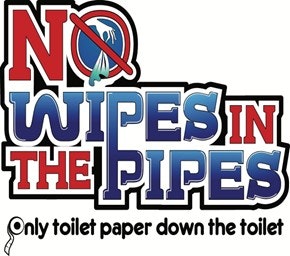What Not to Flush - Protecting Our Sewer System

Please Flush Responsibly
The sanitary district values collaboration with the customers we serve. Flushing the wrong things down the drain can damage the sewer system that carries wastewater and can cause pipes and pumps to clog. Unfortunately, over the years, people have turned the toilet into a trash can, it can also lead to a sanitary sewer overflow in which water gets backed up into your home, your neighbor’s home, and even onto the roads.
What Can You Flush?
It’s simple, the toilet is only meant to flush the three P’s – “pee, poop and toilet paper”.
What Not to Flush
Although they appear harmless at first, when these items (see list below) get flushed down the toilet they can damage treatment facilities, necessitate expensive cleanups or repairs, increase wastewater charges, and create a toxic environmental issue for the community. In order to help everyone we have outlined some items that should not be flushed:
- Baby/Facial/Cleaning Wipes
- Bandages/Bandage Wrappings
- Cleaning Wipes (of any kind)
- Paper Towels/Rags
- Facial Tissues
- Tampons/Applicators/Sanitary Napkins
- Cigarette Butts
- Q-Tips, Cotton Swabs or other Cotton Products
- Dental Floss or Hair
- Disposable Diapers/Nursing Pads
- Plastic Items
- Rubber Items (ex. Gloves, Condoms)
- Disposable Toilet Brush
- Prescription & Over-the Counter Medicine
- Fat, Cooking Oil, Grease
- Kitty Litter/Pet Waste
- Needles or Syringes
- Hazardous Wastes (cleaners, auto fluids, poisons)
- Paint/Solvents/Sealers/Thinners
“Flushable” Items
Items with packages that say “flushable” or “safe for pipes” don’t necessarily make it true. Many items marketed as disposable or flushable are not biodegradable like toilet paper. These items clog pipes, tangle pumps, slow down or stop pumps, or cause sewer overflows into homes and streets.
FROG (Fats, Rags, Oil & Grease)
When Fats, Oils, Rags and Grease go down the drain, they build up in pipes to cause clogs. Never pour grease or oil into your sink or drain or garbage disposal. Also, try to use your garbage disposal less as eggshells, seed, meats and uncooked vegetable matter does not break down in the sewer system or in the treatment plant. Any other supplies should be discarded appropriately.
RV Dumping (Recreational Vehicle)
It is found that customers are also dumping RV’s and campers into the sewer system. A known problem is the use of chemical toilet products used to control holding tank odors and waste decomposition in RV’s. The commonly used chemical, formaldehyde, has been found to be a non-biodegradable toxic chemical substance. Any toilet chemical product containing formaldehyde in any concentration should not be used. We are not suggesting that people give up the use of any holding tank treatments. However, should seek use of tank treatments that use enzymes and beneficial bacteria which are reported to help break up and consume the odor-causing matter in holding tanks.
